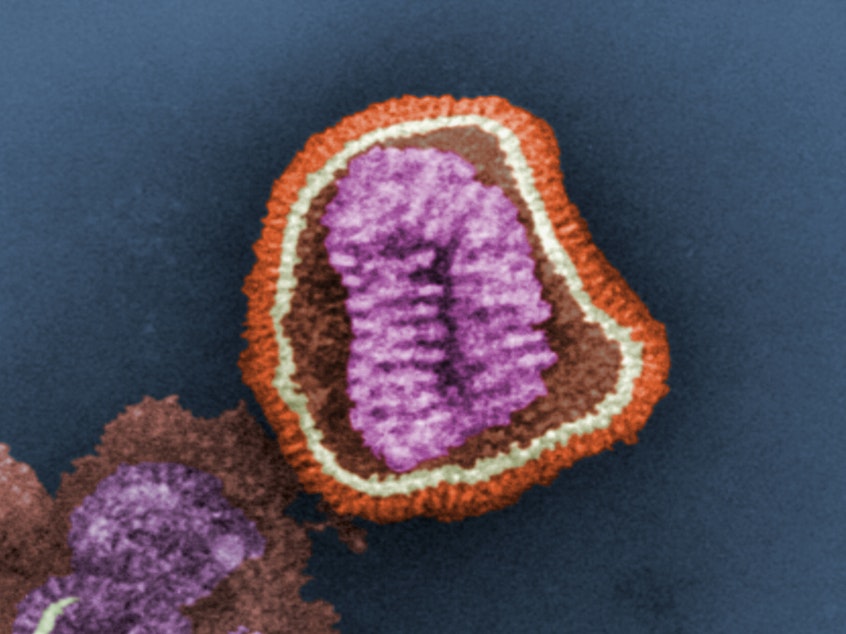Why it’s crucial to get a flu shot as the Covid-19 pandemic continues

Just over half of adult Washingtonians, about 51%, got a flu shot last season. That's a smidgen better than the national rate, but there's still a big gap between 51% and the state and CDC's goal, which is 70%.
With health professionals warning of a potential double whammy of Covid-19 and the flu this fall, what's the plan to get more folks vaccinated?
Dr. John Lynch is an infectious disease physician with University of Washington Medicine, and directs Harborview’s infection control program.
This interview has been edited for clarity.
The message is a flu shot this year is more important than ever with the coronavirus that's still around and mutating. So, why exactly the focus on the flu shot?
You have to remember that flu vaccinations are really one of the most powerful tools we have to prevent influenza from happening. A big challenge we're facing this year is that folks who may have influenza may look exactly like someone who has Covid-19. The same way the other direction.
So, you can imagine how that could really complicate the evaluation of someone in a clinic or emergency department who has flu-like symptoms.
What are the different ways you're looking to increase flu vaccinations given out this year?
Sponsored
We're putting together just basically enhanced processes to get patients easy access to vaccines, whether they show up for a primary care appointment, for a regular visit, maybe you show up in the emergency department because something happens, you’re feeling very sick or you get hit by a car. Is that an opportunity to get a flu shot? We're really just trying to make the flu vaccine accessible to all of our patients, no matter where they show up on any of our campuses or clinics.
There is some evidence from the southern hemisphere flu season there was not as severe as some had predicted. What implications could that have for us here?
Fingers crossed, we'll have the same experience here in North America in the United States around this:Low levels of flu circulating, thanks to probably hand hygiene and the physical distancing — all the things that we're doing. But we also have to recognize that we haven't always done a great job around all those things in the United States.
We are definitely preparing as if there's going to be a big flu epidemic, and we're going to still have lots of Covid cases — that's our preparation. I would be very happy to be absolutely wrong about all of that, but I think we'd be mistaken to not prepare.
When people are asked why they don't get a flu shot, some say that it's because they don't believe it works. What would you say to those people?
Sponsored
It does work, to some extent. It is not a perfect vaccine. It doesn't prevent every case of influenza, but it prevents a lot of cases of influenza. Even if it prevents 40% of infections, when you look at how many cases of influenza happen every year, that is a very, very large number.
And it's going to be especially challenging this year. Again, we have to remember Covid and influenza look very similar. That's going to create a lot of challenges for us.
Our state is way behind when it comes to getting kids vaccinated for flu. About 64% of our children under the age of 18 got a flu shot last season. Compare that to Massachusetts — their rate was 81%. Why is it so important for kids to get a shot, especially this year?
If you get vaccinated and don't get the flu, not only is that great for you, but you're also not going to be putting other people at risk who can't get vaccinated: If you're under six months of age ... you're very much older, or having an immune-compromising situation.
It's really the healthy kids and the healthy adults who are probably the most important group of folks to vaccinate, to keep everyone else safe.
Sponsored
We are just at the beginning of this year's flu season. What would success look like to you?
I think that if we have really high-level flu vaccination out there, and we see very little flu circulating in the community. What's the downside? What's the worst case scenario? A big flu season, and a big Covid-19 season; trying to get kids back to school, and to get our society up and moving again.
If we see those things, a big flu epidemic, big Covid-19 epidemic, we're going to be much farther behind than any of us ever wanted to be.
Listen to the interview by clicking the play button above.





